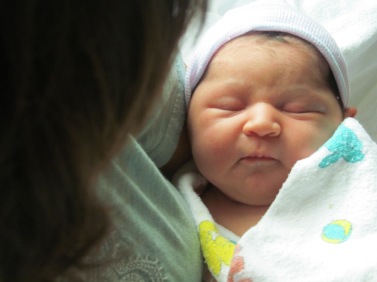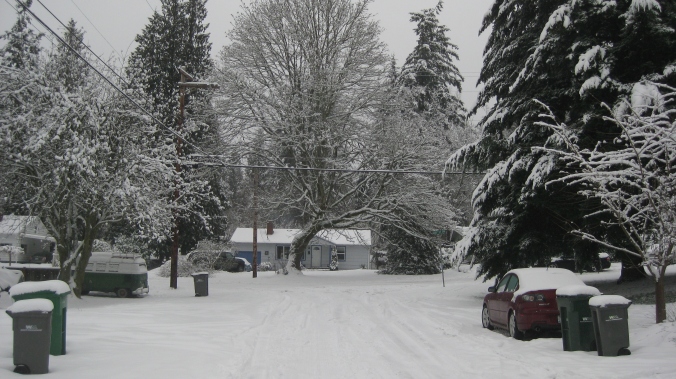I’m taking a creative nonfiction writing class this quarter in which my first assignment was to write a descriptive essay about a place. Here is my essay about my friend Josue’s house in Costa Rica on the first night I was there in June. It’s a bit longer than what I usually post, but I hope you enjoy it.
_ _ _
The little, bronze key unlocked the iron bars. They swung out toward me, creaking, and invited me in. “Es mi casa,” said Josue. As we walked up the ceramic steps onto the ceramic porch and passed the threshold, it was too dark to notice the mint green paint covering the cement walls outside the house.
The lights at first hurt my eyes. I fought with the light, desiring so badly to surrender, but unable to convince my lips to say good night to fresh faces, fresh names, fresh, wet kisses on my cheeks. It was late. I’d flown from Seattle to stay in a stranger’s house and now, twelve hours later, I’d arrived. Their eyes rested expectantly on my sweaty, greasy figure, waiting, perhaps, for an explanation. I had none. It was curiosity that brought me here and curiosity that kept my heavy eyes glancing around the room.
I sat at the kitchen table, collecting gifts – a tall glass of guava juice, cookies, a Samsung phone for my time in the country, a house key. If it was theirs it was mine now too, and this was the center of their world. I knew because I’d seen pictures of friends — Juan Pablo and Gabo — sitting here, hanging out; Josue blowing out twenty-two birthday candles; the Martinez family eating dinner years ago on this same pastel blue table-cloth with white doilies.
I tried calling my mom that night to let her know I was safe, but there was no answer. She usually went to bed early. It was Tuesday so she’d probably spent the evening in our living room on the worn, green couch watching NCIS or some other cop show. I imagined my dad snoring on the adjacent couch and my mom annoyed at the interruption. She would have gone to bed early because her eyes don’t handle mornings well. I left a message and rejoined the expectant faces.
No walls separated the table from the brown suede couches in the living room where my Costa Rican dad was torn between the Saprissa game and the American girl at his kitchen table. His wife was occupied with making me comfortable, using Josue and her daughter as translators, running between rooms to find more accoutrements to give me. Comfortable chaos darted in and out; people kept coming. A sister, a friend, a brother, a nephew.
The TV spoke a language I could hardly understand and so did the house. Puerto; door. Mucho gusto; nice to meet you. Cocina; kitchen. Comida; food. Buenas noches; good night. My Spanish-speaking mom and dad kissed me good night, again welcoming me to their home. The chaos dissipated, but the house wouldn’t rest. The TV remained on. American sitcoms; National Geographic; gaudy Christian praise shows; Spanish-speaking cartoons I’d never seen before.
The refrigerator hummed. It must have been hungry. I noticed it’s belly held some cheese, fish, rice, guava juice, margarine, and other condiments, but not much more. Next to the fridge, on the orange, sponge-painted walls was a painting. A small, circular, white house with a Spanish roof. The house was surrounded by wild flowers and a white horse. I knew this painting. Josue took a picture next to it a couple of months ago and posted it on Facebook. I often looked at that picture and wondered where he had taken it, wondering also about the white horse and how beautiful it would be to be there too.
“Let me show you my house.” Josue left his laptop on the blue table-cloth and we got up to wander the empty house.
My sweaty, bare feet stuck to the ceramics as we walked out of the kitchen and came to a cross-roads. To my left was a sink. A bathroom also, with a toilet and shower, but outside the bathroom, in the center of the cross-roads, there was only a sink with a mirror above it and a bright light illuminating the tired eyes that stared back at me.
Across from the sink was a closed door. My sister’s room, or so I was told. And next to that, an open door. My room. Before it became mine, it belonged to Josue’s 7-year-old nephew. He painted blue stripes on the wall and hung up personal artwork. A picture of him and his mom holding hands. “Te amo,” it said. There was a bed and a closet, but all toys were put away. A large TV sat on the ground in the corner by my bed. I’m not sure if it worked, but it did guard me while I slept.
I turned off the light, and forced the door shut as it protested, then followed Josue down the hallway. To the left, another closed door. His parents’ room. To the right, the door was cracked. I curiously let myself in and my heart fluttered. I knew this room.
I laughed and smiled as I noticed a line of blue stars and moons that danced all the way around the room. “Nice blue stars,” I chuckled. Estars. We often joked at his difficulty in saying the English word.
This is the room Josue and I often skyped in. I remembered the first time we met. I was introduced that night to the white lace curtains that hung behind his headboard and the blue stars and moons that his sister painted years ago when the room belonged to her. He told me, “Wait. I have to show you my guitar.” Those were the first words my brother ever said to me as he reached for his out-of-tune beauty and played a song for me that he had written. We talked for three hours that first night, and now we stood in the same room where we met two years ago. His guitar rested against the closet doors. He picked it up to show me again and told me dreams of owning a new guitar with a prettier sound.
It was after midnight when we finished wandering, but I wasn’t ready to sleep. Rain tapped the zinc roof, reminding me of my lullaby in Seattle. We walked back through the hallway, beyond the cross-roads, and across the threshold where I had taken my first steps into their world. Josue and I stood on the ceramic porch, leaning our faces into the iron bars and watching the rain and delinquents pedal the streets. “I like the smell of Costa Rica,” I told Josue. “It smells fresh.” “It’s the rain,” he said. “And the humidity.” I nodded in agreement. Whatever it was, it smelled like home.
The moon was a bright crescent. Josue asked what the moon looked like in Seattle. It hadn’t occurred to me it might have looked different, but it must have. I couldn’t recall. I didn’t remember much about the home I’d slept in last night. Why was that? Why did something so familiar feel so distant now that thousands of miles separated my skin from its home? And how could this home, this place so unfamiliar, feel like a place I’d always known?
After three hours of sitting at the kitchen table, the Martinez home was now also mine. The puerto was the entrance to my home. The cocina was the center of my world. The comida in the hungry fridge was as much mine as it was Josue’s.
These mint green walls and the home inside it were not merely necessities for this family, nor were they simply a collection of things that defined their culture. The guava juice, the painting of the white house, the blue stars, the key to the iron gate – they were pieces of a world that gave my heart rest.


